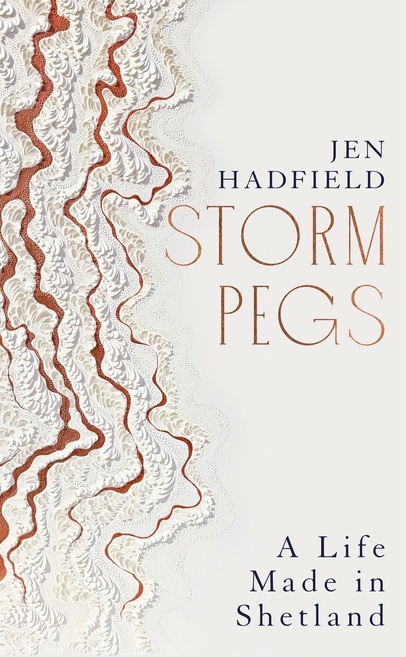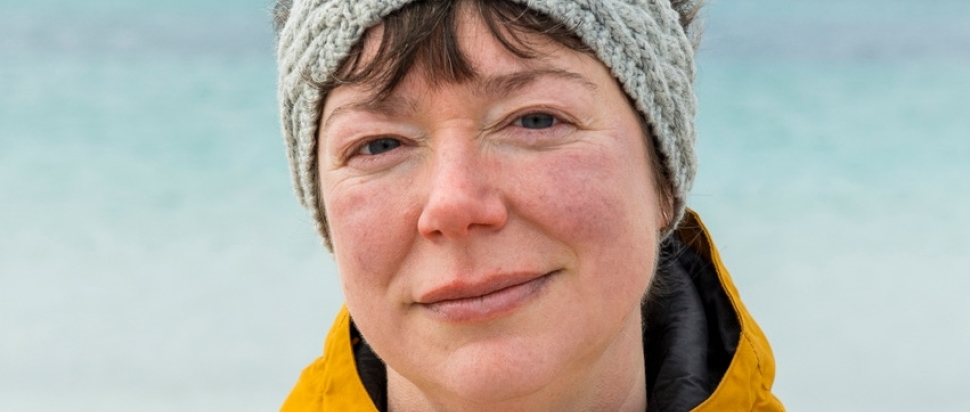Jen Hadfield on her Shetland memoir Storm Pegs
We talk to Jen Hadfield about her eco-memoir exploring the movements of land, people and languages on the Shetland Islands
The sense of something happening over and over again is precious in Jen Hadfield’s Storm Pegs, a poetic tracing of cyclical movements in the land, people and language that form Shetland’s fabric. The flowing prose, full of feeling, explores the seasons and movements that eschew the rigidity of the conventional calendar in favour of the movements of the weather and the sea. “That’s the thing I’m really interested in,” Hadfield explains. “When I first thought how I would shape this book, [it] was to have a series of micro-essays without a connecting narrative structure. [It] would just be moments of presentness, in place, and I wanted them to be as intense as I could possibly make them, almost a wee bit trippy in their intensity sometimes.”
In Storm Pegs, we’re given a privileged insight into Shetland, which to many is an almost mythical place characterised by its farawayness and not much else. Part of this insight is the language, Shetlaen or to some Shetlandic, which runs like a secondary narrative thread throughout the book. Each word, threaded through the prose and catalogued in definitions at the beginning of each chapter, becomes an opening into something much bigger. “It was really important to me to be really honest about my own partial understanding of place through language,” Hadfield explains. “If I just wrote about Shetland entirely from my perspective and didn’t speak about language, it would be like pretending that at least half the population doesn't exist. And that this multiplicity of perceptions of place, and belonging and home doesn't exist. And that felt wrong too.” She continues: “You’re trying not to speak for people.”
Throughout the book, this relationship to language is a reading of place, driven by sensation that dominates the flowing poetics of each moment. Hadfield captures the fallibility of language and moving between languages; swilling new words around and in doing so touching the routes through Nordic, old English, Scots and elsewhere they have travelled. “As I write after the cockle and welking incident, just trying to pick up a pen and describe something that literally just happened is really difficult,” she explains. “And I felt like I was banishing myself from that state by stepping into language. So it’s always a faint imitation, but imitation is the thing I’m most interested in in writing and poetry. I’m trying vaguely to recreate something – that everyday astonishing in the wild world – in other materials.”

In 2005, while on Shetland's southernmost island Fair Isle, Hadfield was gifted a copy of A to P: a partial dictionary of Fair Isle words with many entries missing their definitions. The book ignited something akin to a dissolution of writer's block, an urge to write again, as well as a permanent move to Shetland. As a newcomer to a place, belonging is a process that has to be navigated personally in an intimate and often internal way: it's not necessarily about acceptance or what is right or wrong but something much harder to articulate. “I never felt that there were tests that I had to pass or that belonging was something that could be granted by someone else, which is a wonderful courtesy I think, because it could be like that,” Hadfield explains. “Islands can be fragile places. I felt that belonging was just a very slow, gradual process of me finding out where I am. And acknowledging my own not knowing, that felt really important. I think I say at one point that the more that I discover the less I feel I know where I am, and I cherish that.”
The idea of a place as remote is something that Hadfield riles against, finding it to be a dangerous stripping of autonomy from a place and its communities, leaving them open to exploitation. “To call it remote you have to be looking from somewhere else,” she explains, “and you’re forgetting that there’s an ecosystem and a community there, for whom this is the centre of the world.” Storm Pegs reorients the world, placing the margins – of communities, of ecologies – back at the centre. “You don’t get a sense of farawayness when you live here,” Hadfield says, “you get a sense of all the people coming and going, that we’re the destination.”
Storm Pegs is out with Picador on 11 Jul
